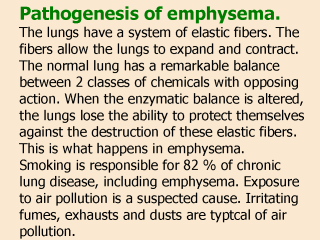| front |1 |2 |3 |4 |5 |6 |7 |8 |9 |10 |11 |12 |13 |14 |15 |16 |17 |18 |19 |20 |21 |22 |23 |24 |25 |26 |27 |28 |29 |30 |31 |32 |33 |34 |35 |36 |37 |38 |39 |review |
 |
A small number of people with
emphysema have a rare inherited form of the disease called alpha 1-antitrypsin (AAT)
deficiency-related emphysema, or early onset emphysema. This form of disease is caused by
an inherited lack of a protective protein called alpha 1-antitrypsin (AAT). Emphysema begins with the destruction of air sacs (alveoli) in the lungs where oxygen from the air is exchanged for carbon dioxide in the blood. The walls of the air sacs are thin and fragile. Damage to the air sacs is irreversible and results in permanent spaces in the tissues of the lower lungs. As air sacs are destroyed, the lungs are able to transfer less and less oxygen to the bloodstream, causing shortness of breath. The lungs also lose their elasticity. The patient could experience difficulty exhaling. Emphysema develops very gradually. Years of exposure to the irritation of cigarette smoke usually precede the development of emphysema. Also, some people may have had chronic bronchitis before developing emphysema. |